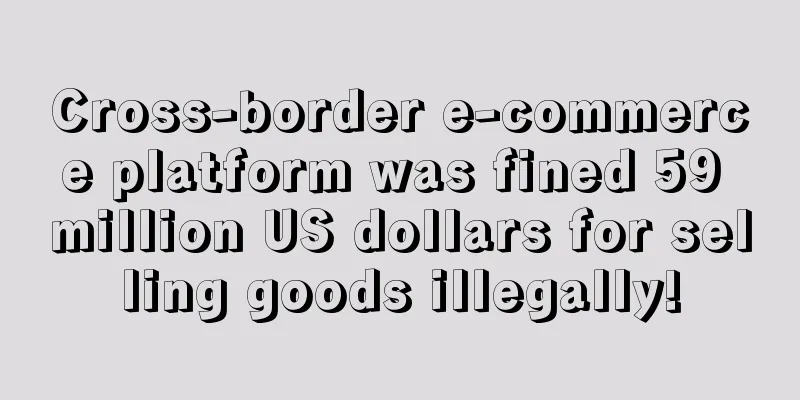A large number of cross-border sellers "died" due to expansion!

|
No longer pursuing rapid sales growth , but seeking "small and beautiful" high-quality development!
In the cross-border e-commerce industry, there are too many companies interested in expansion.
At the beginning of 2023, Xiao Zhang decided to replicate the rapid growth of the previous two years, massively expand the team, move into a larger office, and develop more new products. After a year of hard work, Xiao Zhang found that things did not go as he wished - the company's overall revenue only increased slightly, but costs increased significantly, and the per capita output ratio was seriously lower than the average level of previous years.
" Lower your expectations . Small and beautiful is the best way out for the company. " After realizing this problem, Xiao Zhang formulated a layoff plan at the beginning of 2024, striving to maximize the company's per capita output ratio and profits starting this year.
More and more sellers have discovered in the process of trial and error that the era of wild growth of cross-border e-commerce has long passed, and the era of testing the comprehensive strength of companies has officially arrived. Under the business thinking of product-oriented and supply chain-based, refined operations, cost reduction and efficiency improvement are essential to not fall behind. Cross-border e-commerce sellers, shrouded in the great changes of the times, have to keep up with the pace of the times and find the most suitable way to survive. Industry insiders generally believe that the two best ways before everyone are to become bigger and stronger, and to be small and beautiful.
The "big" and "strong" in becoming bigger and stronger complement each other. Becoming " big " means expanding the business scale, increasing the number of employees , and expanding the venue . Becoming "strong" means that the company can continue to operate steadily and its profits will increase year by year. Cross-border giants such as SHEIN and Anker are excellent examples.
Everyone wants to be Anker, but not everyone can become Anker.
The foundation of "big" is "strong", otherwise it is easy to fall. In fact, many sellers like Xiao Zhang have been taught a severe lesson by "being big but not strong". What's worse, there are a large number of cross-border sellers who "die" from expansion.
In comparison, the pressure on "small and beautiful" seems to be smaller, and it seems to be more in line with the basic situation that "cross-border e-commerce is full of small and medium-sized sellers."
Another group of sellers who realized this truth took the initiative to seek change at the beginning of 2024 and only focused on being small and beautiful...
Expansion leads to losses, and sellers suffer
As early as a few years ago, Xiao Liu had begun to pursue "small and beautiful".
In 2015, cross-border e-commerce was still in a period of rapid development. Xiao Liu was lucky enough to come into contact with this industry. At the beginning, he only worked on the Wish platform, and then gradually switched to other platforms. After accumulating enough experience and funds, he officially started his solo journey in 2018, and his revenue soared.
Performance and chaos soared together. Faced with the sudden doubling of performance, Xiao Liu suddenly felt overwhelmed.
"The ceiling for individual development is definitely very low. Only by developing a team and training people to divide things and free up your time and hands, can you have time and energy to do other things." During that time, Xiao Liu dreamed of expanding and opening more stores to replicate the existing success. In addition, since the office is in a rented house, he stays at home almost every day, and it is impossible to distinguish between work time and entertainment time. Starting a company can formalize work, so that you can work hard during work hours and live happily after get off work.
The sudden increase in performance during the epidemic finally made Xiao Liu's wish to expand the team come true. In the first year of expansion, the performance did rise as expected, but after careful calculation, the per capita output ratio was not high. "The per capita performance after the expansion was only more than half of the previous level. The company's costs increased significantly, and the overall profit increased instead of decreasing."
Unlike Xiao Liu, whose profits declined after expansion, Xiao Li's experience seemed to be even worse. His annual income went from nearly 10 million yuan at the beginning to an annual loss of nearly 1 million yuan.
Xiao Li’s original operation team was very small, with only three people including his assistant. He made a lot of money by relying on several popular links. Seeing the company’s considerable profits, Xiao Li’s ambition naturally grew like many people. The first thing he thought of was expansion, and he even hoped that one day the company would go public. So he moved the company from the original small city to a big city, changed to a larger office, and increased the number of team members to more than a dozen. The next step was to wait for the performance to take off. However, things did not go as he wished. Not long after the expansion, several of the company’s best-selling links were besieged and blocked by the top sellers in the category, and were once removed from the shelves. The company’s business stagnated for a short time, and it was not easy to get back on track. When the company calculated the revenue at the end of the year, it was not surprising that it had suffered a huge loss...
"Expanding a team is far more complicated than you might think. If you simply expand the company without the corresponding risk resistance, then the hit products that you once prided yourself on will become a time bomb that drags down the company." After suffering a heavy blow, Xiao Liu had to lay off a large number of employees and minimize the company's operating costs in order to survive.
In addition to Xiao Zhang, Xiao Liu, Xiao Li and others, there are also a large number of leaders of cross-border e-commerce companies who realize that "making more money through expansion" is an unattainable fantasy, and the epidemic is a very important time node.
In 2020, a sudden epidemic swept the world. Cross-border e-commerce ushered in a period of rapid development dividends, and the business of cross-border sellers also showed exponential growth.
A group of radical bosses started the "Great Leap Forward" mode. Expansion and listing were their mantras. The expansion speed was too fast, which formed a sharp contrast with the limited funds, limited capabilities, and limited development speed. The company was soon dragged down.
Struggling on the brink of life and death, some eventually "died" from expansion, while others recovered from the major blow, remembered the lessons after starting over, and resolutely refused to become a cross-border company that is "strong on the outside but weak on the inside."
From pursuing expansion to sticking to small and beautiful, Xiao Liu and other sellers found that team expansion brought many disadvantages to the company:
First, the cost expenditure has increased significantly, and the profit has not met expectations. Expansion means moving into a larger office, hiring more employees, and rent, utilities, employee wages and social security are all monthly expenses that must be borne. If the company is big but not strong, it is easy for the profit to fall short of expectations. In reality, there are many sellers whose annual sales before and after expansion are not much different.
Secondly, in terms of management difficulty, there is a huge gap between large companies and small companies. Expansion is not as simple as recruiting people to sell goods. It involves talent training, product line planning, finance, management and other aspects. Each aspect requires a mature management system. If you are not careful, it will bring different degrees of losses.
Moreover, the things to worry about and the pressure to bear after expanding the team are far more than you can imagine. With a team, the company has to run non-stop to pay for daily expenses. The bigger the business , the more money the company needs to advance, and the sellers are extremely insecure.
Finally, the risks surge after the expansion of the team. In addition to being alert to the economic losses caused by poor internal management (improper stocking, unclear cost expenditure, etc.), sellers should also pay attention to avoiding open and secret struggles among peers in terms of the external environment. Relatively speaking, small sellers are easier to turn around and have more opportunities to start over after being hit. Large sellers are closely watched by countless peers when their links are ranked high. If they do not have the ability to resist risks, sudden situations such as spoofs can easily cause the links to be removed from the shelves, and the company will also suffer heavy losses. There is also a high possibility of a cash flow crisis, because the funds occupied by the hot links are very large. In addition to the goods already in FBA, overseas warehouses and other warehouses, there are also goods being made by factories and goods floating on the sea, all of which require a lot of advance payment.
Industry insider @风中厂长 said that in the past, because many cross-border e-commerce platforms were in the bonus period, some sellers who were at the forefront of the trend and could only make 10 million yuan easily achieved a small goal, which also gave them an illusion that they were extraordinary and making money was really easy, so they set bigger goals. In fact, for many businesses with relatively low thresholds, including clothing, hats, shoes, socks, daily necessities, etc., expansion is not the best choice. For example, if you originally made about 800,000 yuan with an annual revenue of 5 million yuan, your life would be comfortable and stress-free. If your annual revenue exceeds 100 million yuan or even more, you will only be exhausted and face greater risks, and the money you actually get may not be much more.
A team of several people earns tens of millions a year! A group of "small and beautiful" sellers quietly make a fortune
Only after suffering a loss will you realize the value of being content with a small fortune.
After experiencing difficulties, cross-border e-commerce sellers have begun to adjust their radical expansion strategies and instead do subtraction, significantly shrinking their product lines in an attempt to increase net profits through high-quality, more flexible small-scale products.
Yienjun learned that, in fact, as early as the beginning of entering the industry, a group of sellers firmly implemented the small and beautiful development strategy. Except for some difficulties in the initial development period, they can be said to have been making money quietly every year after the product stabilized.
After the small team leveraged the huge revenue, Xiao Li was ambitious to expand but failed miserably. Xiao Li's friend thought again and again, but still resisted the temptation of expansion, focused on small and beautiful, and now lives a very comfortable life. He knows the importance of intensive cultivation, and has dug out a more segmented potential track based on the categories he is familiar with. Now he has a link in his hand, and he has full control over the development, production and sales of all the links. Now, this link is always at the top of the platform category.
Deepening vertical categories is the development focus of more and more cross-border sellers, and it is also in line with the current mainstream development of cross-border e-commerce. Xiao Zhou, who is well aware of this principle, has been deeply implementing this route. On this basis, Xiao Zhou also realized that compared with blindly expanding the team to increase sales, increasing per capita output is actually more important. Today, a team of less than 10 people has an annual revenue of tens of millions.
Xiao Zhou regards the output of human resources as the focus of the company's performance assessment. Internal management has its own set of 80/20 principles. For example, 20% of employees generate 80% of profits. The company will focus on training these 20% of employees and give them high salaries, and reduce the remaining 80% of employees as much as possible. The same is true for product lines. The profitability of products is reviewed regularly, and those products with poor revenue and profit are generally cut in time.
It can be observed that in the "small and beautiful" company model of cross-border e-commerce, mom-and-pop stores are a phenomenon that cannot be ignored.
Husband-and-wife stores are the most basic and natural form of partnership in cross-border business. There are a large number of them. They basically operate on platforms such as Amazon. They understand or are proficient in almost all aspects of cross-border e-commerce operations. They personally handle the selection of products, product listing, operation, advertising adjustment, after-sales service, etc., and outsource the art, logistics, production design and other links to professional teams. The husband and wife do not aim to build a brand, but to maximize profits. To a certain extent, we can also call husband-and-wife stores "ant soldiers" because their business is relatively stable, and they earn as little as 200,000 or 300,000 yuan a year, and as much as 400,000 or 500,000 yuan or even more.
After a year of expansion, Xiao Liu realized the cruel reality and changed his business strategy in time, returning to the small and beautiful business model. Now he is following the route of a husband-and-wife shop. His current work focus is to maintain several old links that have been in use for a long time, and he also develops several new products every year. In terms of work division, Xiao Liu is responsible for the product side and overall operation, while his wife is responsible for the store customer service and handling of negative reviews and other matters. Although the annual revenue has decreased, the overall profit has increased significantly.
"Compared with the days of expansion, the pressure on me has undoubtedly been reduced a lot, and life is happier." In Xiao Liu's view, the husband-and-wife store has a smaller business, and they do not have to worry about product development and other work, so the pressure they have to bear is naturally reduced; in terms of life, the husband-and-wife store can be run in their hometown, which can effectively reduce costs, and they have relatively free time, so they can spend more time with their children and family. After the peak season every year, they still have plenty of time to travel.
There were many detours before the smooth road. Now Xiao Zhou has successfully found his position. His cross-border journey was not smooth at the beginning. In the face of a serious involutionary business environment, Xiao Zhou also followed the footsteps of his peers in the category and set a goal of strategic losses. Several products were among them. In the end, these products did not usher in the situation of "outlasting peers and making money". Instead, they almost lost money from the beginning of the year to the end of the year, which eventually led to a significant increase in operating costs of about 50% that year, and the company's overall profit fell rapidly.
"Small but beautiful" means that the team is small and the business is relatively simple; however, these companies generally provide comprehensive and extreme products or services in a certain field, with details in place, and they do not pursue speed but perfection. Many small companies have the characteristics of "small" but lack the characteristics of "beauty", and are likely to become runners-up in the end.
In the cross-border circle where there are many hidden talents, there are many "small and beautiful" companies with better productivity than Xiao Zhou. Especially in the early years, cross-border e-commerce companies such as Amazon were still in the wild growth stage. A group of early players with a team of about 3 people could achieve sales of over 100 million yuan, which can be said to be making a lot of money.
Summarizing the successful characteristics of these sellers, we can find that most of them include the following points:
1. The company leader needs to be knowledgeable, extremely professional and proficient in key businesses. Yi Enjun learned that many bosses of "small and beautiful" companies are not only product developers, but also operations managers. This means that they have mastered the two most important aspects of cross-border e-commerce. At the same time, they are familiar with the operations of other basic aspects of cross-border operations, such as listing optimization, replenishment, stocking, inventory management, after-sales and other work.
2. The company operates in a professional and systematic manner. Although it is a small company, all costs and expenditure accounts are calculated clearly, which will facilitate the subsequent reconciliation and review, and also provide a reference for cost optimization.
3. Deepen the main product line. At the beginning, dig deep into potential products in a certain large category, find the best-selling products of your company, and concentrate on making this product that you are best at.
4. Small-scale rapid trial and error. After the company has found its main products and laid a solid foundation, it will develop new products within its own capabilities to find new growth. The specific method is to continuously make small-scale shipments and conduct rapid trial and error. If sales are good, the budget will be gradually increased. If sales are not good, the company will make a decisive decision and immediately cut off the unprofitable SKUs to minimize losses.
5. You can build a brand, but you cannot be obsessed with it. In recent years, the slogan of branding has been heard throughout the cross-border circle. We cannot deny that brands are the mainstream of cross-border development in the future. This does not mean that non-branded products will be squeezed out and have no room for survival. Moreover, the requirements of brands for funds, marketing, etc. are far beyond the imagination of ordinary small sellers. For example, the leading cross-border seller Anker not only masters core technology and intellectual property rights , but also has supply chain advantages and first-class brand promotion. The important prerequisite for doing these factors well is to spend a lot of money. Small sellers who do not have the relevant conditions do not need to dream of becoming the next Anker, but can work hard to optimize products, operate, etc., which can also achieve the same goal of increasing repurchases as branded products. Making money is the best way out for small sellers.
Thoughts on cross-border e-commerce operations: Will small companies “die” after expansion?
"If I have enough ability and conditions to expand, I will definitely choose to expand the scale of sales." Yienjun found that many sellers who stick to small and beautiful, while recognizing the existing business model, are also eager to become bigger and stronger.
"Small and beautiful" companies are very attractive, but will small companies "die" after expansion? Industry insiders concluded that it is difficult to tell whether small and beautiful or big and strong is better, and it is difficult to say the pros and cons of the two because the logic is different.
If a company has extremely strong product and supply chain advantages, has entry barriers, patents, technological advantages, sufficient funds and excellent management capabilities, and at the same time can withstand price wars and various malicious operations from peers in a cross-border circle where various risks may arise at any time, then "big and strong" will not be an empty talk. By then, the profits earned each year will basically increase steadily.
Everyone wants to be an Anker, but not everyone has the ability to be an Anker.
There must be many people who can meet the above conditions, but this group may not be worth mentioning compared with the very large group of small and medium-sized sellers.
In cross-border e-commerce, small and medium-sized sellers are the mainstream. They find ways to squeeze into various categories of the industry and constantly look for hot products. Their operating methods may be different and their locations may be different, but they all have a common goal: to make money within their own capabilities.
Now, even cross-border e-commerce platforms such as Amazon have entered the stock market, and even many categories are on the decline . It can be foreseen that competition for standard products will only become more brutal in the future. The best way out for small and medium-sized sellers is still to be small and beautiful , with differentiated products and precise demand positioning.
"What suits you is the best. Time will tell you that cross-border e-commerce is most suitable for small teams." said a large number of small and medium-sized sellers. |
<<: Unable to defeat Temu, the old European fashion platform filed for bankruptcy!
>>: The top ten most searched product keywords on eBay in 2023 are released
Recommend
Ozon Black Friday sales reach 5 billion
The most important sales event of the year , Blac...
JD.com adds another step to its Middle East strategy, reaching cooperation with UAE B2B e-commerce
Through this partnership, Tradeling will list JD....
A cross-border dark horse emerges from a niche track and the product becomes a hit!
In the process of cross-border expansion, how to ...
During the peak season, air freight capacity in the Asia-Pacific region has been tightened and freight rates have risen
According to foreign media reports, due to the ch...
The information submitted by Amazon sellers must be true, otherwise their accounts are at risk of being suspended!
The editor learned from Amazon’s official seller ...
The search volume on European and American e-commerce platforms is 5 times that of brand websites
Recently, research organization InRiver conducted...
Amazon is doing something! 5% of sales will be returned to sellers
It is understood that Amazon Logistics (FBA) rece...
Another product was recalled, and Amazon sellers were required to refund more than 500,000 yuan
Recently, a seller on Amazon UK reported that Ama...
What is Vendor Express(VE)? Vendor Express(VE) Review, Features
Amazon VE is the abbreviation of Amazon Vendor Ex...
What is Movilred? Movilred Review, Features
<span data-docs-delta="[[20,{"gallery"...
What is Shunli Intellectual Property Law Firm? Shunli Intellectual Property Law Firm Review, Features
Shunli Intellectual Property Law Firm provides mo...
What is Thesaurus
Thesaurus is a free tool that searches for keywor...
South Korea's GDP returns to the top 10 in the world! Unemployment rate rises to 21-year high
According to the unemployment statistics recently...
What is ALC? ALC Review, Features
ALC, also known as Andrea Lieberman Collection, is...
eBay launches new features to help sellers promote their products
eBay 's latest advertising feature, Advanced ...









